A century of tradition and change
Published 6:15 am Friday, April 21, 2023

- A cow walks across snowy pasture on the McGirr Ranch in Fox on Friday, March 31, 2023.
FOX — It takes an overwhelming amount of dedication to do anything for more than a century. Take that dedication, multiply it exponentially and you’ll come close to what it takes to be a rancher for 100-plus years.
Bud and Kelly McGirr have that dedication in abundance. Their home place, the McGirr Ranch in Fox, has been a staple of Grant County since the ranch was started in 1876 by Kelly’s great-great grandfather.
By 1879 the ranch had been deeded, and 100 years later the McGirr Ranch was recognized as a century ranch. A lot has changed since McGirr’s great-great grandfather first laid eyes on the Fox Valley as a young 17-year-old, but the McGirr Ranch has remained in the hands of the family for five generations now.
The family ranch house is one of the most prominent buildings in the tiny community of Fox. The home itself was built sometime in the 1890s, although Kelly McGirr can’t say exactly when with certainty.
The ranch started as a 640-acre homestead, but has grown over the years to cover more than 4,000 acres with 350 head of cattle. Today, Kelly and her 78-year-old father, Bud McGirr, run the entire show.
This is possible because Bud, the patriarch of the family, decided to streamline his operation some time ago. The result is that a lot of the work that used to need multiple people to get done can be finished by a single person with the help of machinery.
“You can do that now because we’ve got the tractors and the equipment and Dad went to the big bales from the hand bales,” Kelly McGirr said.
Along with the machinery have come other changes that have simplified the way the McGirr Ranch does business. For instance, the ranch used to have milk cows when Kelly was a child, but it doesn’t now.
The way the ranch moves cows has also changed. Rather than trailing cows and “pushing” them over the mountain using cowboys on horseback, cows are now loaded into trailers and pulled over the mountain using trucks.
The ranch used to have a chicken coop that was the source of farm fresh eggs and the occasional chicken for butchering. That is also a thing of the past.
“So things things change. And I guess they kind of have to,” Kelly said.
One thing that hasn’t changed: The McGirr Ranch still runs cattle. The types of cattle on the ranch have varied over the years, but the ranch’s reputation as a cattle outfit has remained.
Another thing that has stayed consistent is the attitude the McGirrs take in regards to ranching. Ranching is a lifestyle as well as a livelihood, something Kelly is keenly aware of.
“Most people don’t retire from ranching — they work till they die or they can’t (work anymore),” she said. “You know, it’s not a 9 to 5. It’s daylight to dark.”
Kelly McGirr believes the continued longevity of the ranch is due to her family’s combination of traditional values and adaptability. It’s a mindset of embracing hard work, changing with the times and being good stewards of the land.
“I know there’s people that probably do it better. I know there’s people that don’t do it as well, but we’re working it,” she said. “Yeah, we have made improvements, we evolved. You got to stay with what the market wants.”
McGirr said one of the biggest misconceptions people have about ranchers is that they don’t care about their land or their animals.
“We care about the land. We care about the animals. We try to manage all of it, too. Make it better. You want to leave it better than how you got it,” she added.
Along with concerns about how people view ranchers come concerns about the future of the industry. McGirr acknowledges that the profession isn’t necessarily as appealing to what would be the next generation of ranchers as it has been in the past.
Some of that can be attributed to changing times. Another factor is the “if it isn’t broken, don’t fix it” attitude among some older ranchers, along with an unwillingness to distance themselves from what is often a decades-long labor of love.
“I think part of it is that the older generation doesn’t — it’s hard for them to let go of the reins, and they don’t want new changes implemented. You know, ‘It’s worked fine for me. Why do you need to go change all this up?’” she said.
Kelly said she has no plans to rush her father into turning over the reins of the McGirr Ranch anytime soon.
“It’s his, and I told him that. I said, “I just get to be here. It is yours until you decide what you’re doing with it,’” she said.
When and if Bud McGirr ever decides to step away from running the McGirr Ranch, you can bet Kelly will be ready and eager to run the place with the same type of tenacity and steadfastness that has kept the outfit going strong for nearly 150 years.









